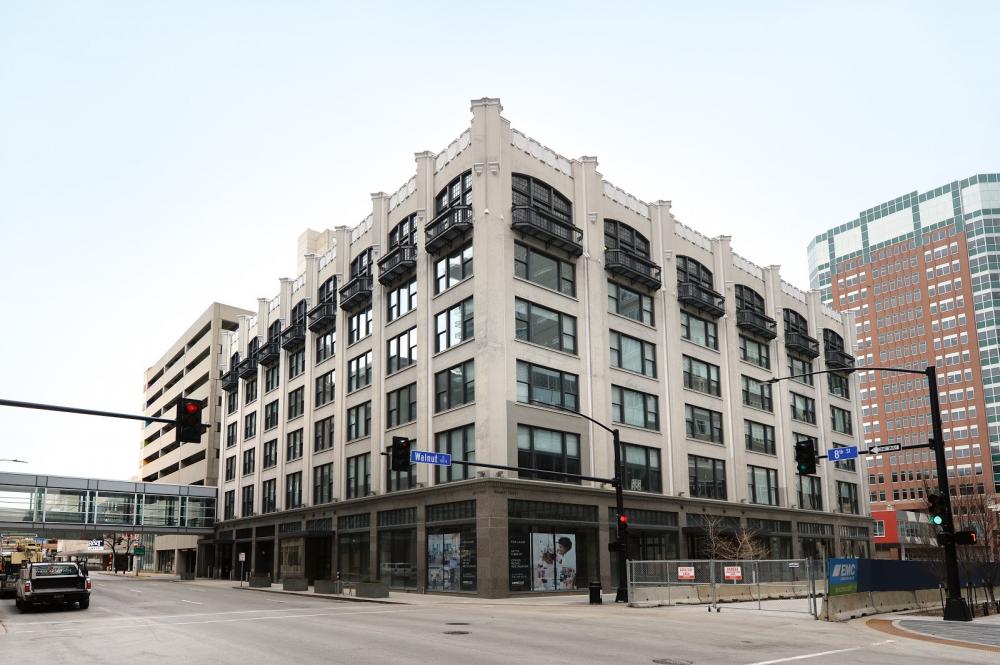Iconic downtown Des Moines building in receivership
‘We are in the process of refinancing the building,’ its owner says

BPC Staff Mar 25, 2021 | 4:16 pm
4 min read time
955 wordsAll Latest News, Real Estate and DevelopmentProperty at 713 Walnut St., which includes the historic Wilkins Building, is in foreclosure, Polk County court records show. The iconic Tea Room is located on the sixth floor of the downtown Des Moines building, which was once part of Younkers department store. Photo by Duane Tinkey
A historic downtown Des Moines property is in receivership and its owners say they are working to secure new financing that, if acquired, will halt legal proceedings and return the property to their control.
Liberty Savings Bank, in a foreclosure petition filed in November in Polk County District Court, claims that Wilkins Redevelopment LLC and other entities and individuals involved with ownership of the Wilkins Building failed to pay loans that were due in February 2019. By June 2020, the borrowers owed the bank more than $15.6 million, according to court documents.
Since then, an additional $925,941 in interest has accumulated, pushing the amount due to more than $17.5 million.
In January, the court appointed Knapp Properties as the property’s receiver.
The Wilkins Building, located at 713 Walnut St., was constructed in 1909 and was once part of the Younkers department store.
“We are in the process of refinancing the building which will allow for resolution to all disputes,” Justin Doyle, Blackbird Investments president, wrote the Business Record in an email. “Blackbird will do whatever is necessary to bring this to closure in the coming weeks.”
Blackbird Investments, a Des Moines-based real estate development firm, acquired the Wilkins Building in July 2015. The building had been part of the Younkers department store, which included a structure to the east. A fire in March 2014 destroyed the east building and heavily damaged what’s now called the Wilkins Building.
Blackbird Investments redeveloped the Wilkins Building, including restoring the iconic sixth-floor Tea Room that is now an upscale events venue. The $26 million renovation included converting the building’s second through fifth floors into 60 market-rate apartments. The first floor includes about 8,200 square feet of commercial space.
The renovation of the building, completed in 2017, was widely praised and in 2019 received Preservation Iowa’s Preservation at its Best award in the large commercial category.
The restoration of the building “is our proudest accomplishment in the short years we have been in business,” Doyle wrote.
He wrote that the project “was arguably one of the most complicated financing, design, and construction projects ever in the history of Iowa.”
The Wilkins property, valued in 2019 at nearly $25.9 million, is owned by a partnership between East West Bank and several individual owners of Blackbird Investors, Doyle told the Business Record. East West Bank, headquartered in Pasadena, Calif., is a full-service commercial bank with more than 120 locations in the U.S. and China, according to its website.
Doyle, in his email, wrote that Blackbird has had “a significant disagreement with our investment partner. This argument has been ongoing for a couple of years … and Blackbird has contributed several million dollars in the last year to honor our partner’s obligations.”
The disagreement apparently led to scheduled payments on loans not being made. Court documents show that the borrowers failed to make payments on four promissory notes: construction, tax abatement, tax increment financing and federal historic credit bridge notes. All were due in February 2019, court records show.
At the time of publication, East West Bank had not responded to telephone or email requests for comment.
Doyle, in his email, wrote that lender Liberty Savings Bank “has been extremely patient.”
While the dispute with East West Bank began before the COVID-19 outbreak, the “pandemic has made the quick resolution more challenging,” he wrote.
Court papers indicate that Blackbird Investments is working with lenders on a refinancing package that would pay off obligations to Liberty State Bank. “The legal structure used on projects with historic tax credits is very complicated with multiple legal entities per project, so refinancing is pretty involved compared to simple commercial projects getting refinanced,” Doyle wrote.
Doyle, in his email, emphasized that there’s been no interruption of services to the Wilkins Building’s residential or commercial tenants. He wrote that the Tea Room is “fully operational and has a busy calendar of upcoming weddings, receptions, and events.”
“Life is returning to normal downtown, and Blackbird is excited about the future of the Wilkins Building and the vibrancy of our city core.”
Liberty Savings Bank, in a foreclosure petition filed in November in Polk County District Court, claims that Wilkins Redevelopment LLC and other entities and individuals involved with ownership of the Wilkins Building failed to pay loans that were due in February 2019. By June 2020, the borrowers owed the bank more than $15.6 million, according to court documents.
Since then, an additional $925,941 in interest has accumulated, pushing the amount due to more than $17.5 million.
In January, the court appointed Knapp Properties as the property’s receiver.
The Wilkins Building, located at 713 Walnut St., was constructed in 1909 and was once part of the Younkers department store.
“We are in the process of refinancing the building which will allow for resolution to all disputes,” Justin Doyle, Blackbird Investments president, wrote the Business Record in an email. “Blackbird will do whatever is necessary to bring this to closure in the coming weeks.”
Blackbird Investments, a Des Moines-based real estate development firm, acquired the Wilkins Building in July 2015. The building had been part of the Younkers department store, which included a structure to the east. A fire in March 2014 destroyed the east building and heavily damaged what’s now called the Wilkins Building.
Blackbird Investments redeveloped the Wilkins Building, including restoring the iconic sixth-floor Tea Room that is now an upscale events venue. The $26 million renovation included converting the building’s second through fifth floors into 60 market-rate apartments. The first floor includes about 8,200 square feet of commercial space.
The renovation of the building, completed in 2017, was widely praised and in 2019 received Preservation Iowa’s Preservation at its Best award in the large commercial category.
The restoration of the building “is our proudest accomplishment in the short years we have been in business,” Doyle wrote.
He wrote that the project “was arguably one of the most complicated financing, design, and construction projects ever in the history of Iowa.”
The Wilkins property, valued in 2019 at nearly $25.9 million, is owned by a partnership between East West Bank and several individual owners of Blackbird Investors, Doyle told the Business Record. East West Bank, headquartered in Pasadena, Calif., is a full-service commercial bank with more than 120 locations in the U.S. and China, according to its website.
Doyle, in his email, wrote that Blackbird has had “a significant disagreement with our investment partner. This argument has been ongoing for a couple of years … and Blackbird has contributed several million dollars in the last year to honor our partner’s obligations.”
The disagreement apparently led to scheduled payments on loans not being made. Court documents show that the borrowers failed to make payments on four promissory notes: construction, tax abatement, tax increment financing and federal historic credit bridge notes. All were due in February 2019, court records show.
At the time of publication, East West Bank had not responded to telephone or email requests for comment.
Doyle, in his email, wrote that lender Liberty Savings Bank “has been extremely patient.”
While the dispute with East West Bank began before the COVID-19 outbreak, the “pandemic has made the quick resolution more challenging,” he wrote.
Court papers indicate that Blackbird Investments is working with lenders on a refinancing package that would pay off obligations to Liberty State Bank. “The legal structure used on projects with historic tax credits is very complicated with multiple legal entities per project, so refinancing is pretty involved compared to simple commercial projects getting refinanced,” Doyle wrote.
Doyle, in his email, emphasized that there’s been no interruption of services to the Wilkins Building’s residential or commercial tenants. He wrote that the Tea Room is “fully operational and has a busy calendar of upcoming weddings, receptions, and events.”
“Life is returning to normal downtown, and Blackbird is excited about the future of the Wilkins Building and the vibrancy of our city core.”
Blackbird’s tower project ‘remains as proposed’
By Kathy A. Bolten | Senior Staff Writer
Five years ago, Blackbird Investments announced plans for an $85 million apartment tower on the northwest corner of Seventh and Walnut streets.
Construction of the project was to begin almost immediately, but didn’t.
In 2018, Blackbird and EMC Insurance Cos. announced they were swapping real estate: Blackbird took control of the eastern half of Kaleidoscope at the Hub and EMC took control of 701 Walnut St., the former site of the Younkers department store.
Blackbird officials said they planned to tear down Kaleidoscope — which included a food court, a bank and other offices — and build its proposed tower on the 555 Walnut St. site. That also has not happened.
Justin Doyle, Blackbird Investments president, told the Business Record this week that “construction and financing is awaiting a significant return to working downtown and cultural activities.”
“Blackbird is cautiously optimistic that this will happen in the coming months and we can resume development late this year,” Doyle wrote. “The project remains as proposed and approved previously.”
Doyle wrote that razing Kaleidoscope can’t be done until construction of the tower is ready to start. A portion of the downtown skywalk system goes through Kaleidoscope, and removing the building “will impact other buildings, occupants, and businesses downtown,” Doyle wrote.
Five years ago, Blackbird Investments announced plans for an $85 million apartment tower on the northwest corner of Seventh and Walnut streets.
Construction of the project was to begin almost immediately, but didn’t.
In 2018, Blackbird and EMC Insurance Cos. announced they were swapping real estate: Blackbird took control of the eastern half of Kaleidoscope at the Hub and EMC took control of 701 Walnut St., the former site of the Younkers department store.
Blackbird officials said they planned to tear down Kaleidoscope — which included a food court, a bank and other offices — and build its proposed tower on the 555 Walnut St. site. That also has not happened.
Justin Doyle, Blackbird Investments president, told the Business Record this week that “construction and financing is awaiting a significant return to working downtown and cultural activities.”
“Blackbird is cautiously optimistic that this will happen in the coming months and we can resume development late this year,” Doyle wrote. “The project remains as proposed and approved previously.”
Doyle wrote that razing Kaleidoscope can’t be done until construction of the tower is ready to start. A portion of the downtown skywalk system goes through Kaleidoscope, and removing the building “will impact other buildings, occupants, and businesses downtown,” Doyle wrote.











